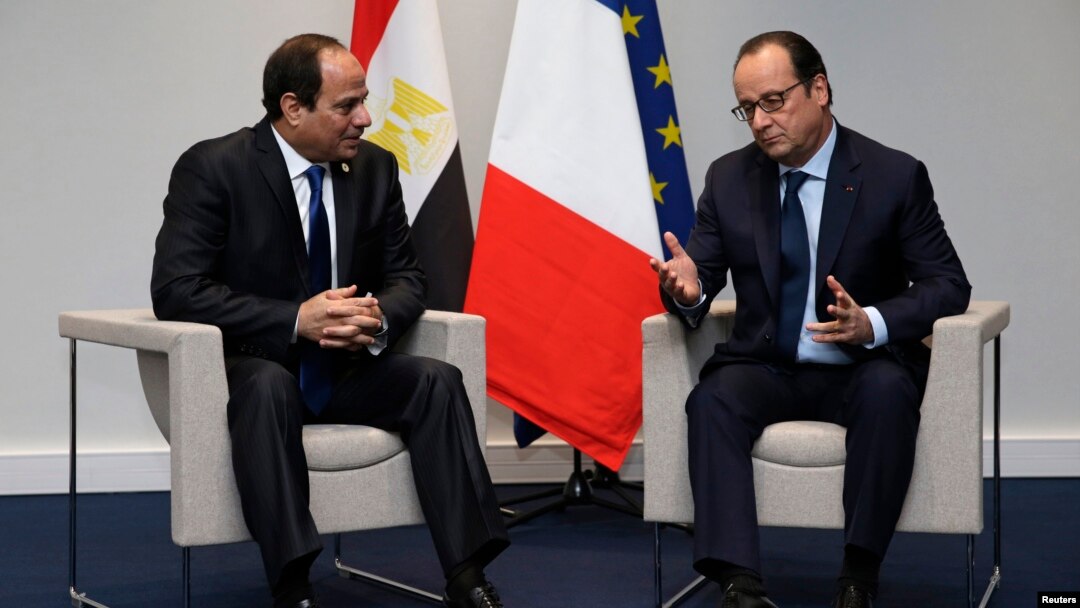French President Francois Hollande arrives in Egypt Sunday for a visit intended to shore up security cooperation and produce lucrative weapons deals despite sharp criticism by rights groups.
Hollande’s Cairo leg is part of a four-day trip to the Middle East that began Saturday in Lebanon and ends Tuesday in Jordan. There, he will address shared concerns with Arab allies, ranging from terrorism and instability in Iraq, Syria and Libya, to the refugee crisis and the long-simmering Israeli-Palestinian conflict.
On Monday, Hollande and Egyptian President Abdel-Fatah el-Sissi will oversee the signing of arms agreements worth roughly $1.1 billion, including Egypt’s purchase of a French military satellite communications system, according to France’s La Tribune website.
Arm sales
The acquisitions add to a string of high-profile French weapons sales in recent months, including multi-billion-dollar deals in which Egypt and Qatar will each buy 24 French Rafale fighter jets. Paris is in discussions to complete another Rafale agreement with the United Arab Emirates.
The weapons sales underscore France’s new role as top weapons supplier to Egypt, edging out the United States and bringing in needed revenue, says Paris-based Defense News correspondent Pierre Tran.
It also sends a message to the United States, which suspended military aid to Egypt in 2013 following the ouster of former leader Mohamed Morsi. While Washington lifted the freeze last year, Egypt has diversified its arms suppliers. Washington’s role in the 2015 Iran nuclear deal was another strike against it.
“They’re thumbing their nose at the U.S., which has disappointed Arab nations specifically because of the agreement with Iran,” Tran said.
By contrast, Paris scored points with its hard-line stance during the Iran nuclear talks, he added. The payback partly came with Hollande’s invitation to become the first Western leader to attend the six-nation Gulf Cooperation Council summit last May.
“He was there while the U.S. was not,” Tran said.
France and Egypt may also sign a deal Monday for Cairo’s purchase of four French warships, La Tribune reports. Once again, Iran’s growing regional clout is a driving force.
“It’s all about Iran,” Tran said. “The Gulf is why Egypt wants warships — to patrol and control the security of the Gulf where all the trade flow happens.”
Rafale sales
The Rafale sales, however, also reflect shared concern about the growing regional threat posed by the Islamic State militant group, he added.
Hollande’s visit to Egypt comes amid growing international criticism over Cairo’s deteriorating human rights record since Sissi took power in 2013. Earlier this month, Italy recalled its ambassador to Egypt, accusing Egyptian authorities of failing to fully cooperate in a joint investigation into the death of an Italian student whose battered body was found in February next to a Cairo-area highway.
In an open letter published in the Le Monde newspaper on Friday, five prominent rights groups urged Hollande to press Sissi to abandon a crackdown against Egyptian nongovernmental groups, and to demand answers on the 2013 death of Frenchman Eric Lang while in Egyptian police custody.
They also called on Hollande to ensure Egyptian authorities will not use weapons purchased from France for internal repression.
“France will bear a heavy responsibility if it abstains for bringing up these points” in discussions with Sissi, warned the groups, which included Amnesty International France, Human Rights Watch and the International Federation for Human Rights.
On Lang, a French Foreign Ministry spokesman said Friday that Paris “is mobilized so all light is shone on this tragedy.”
A New York Times editorial this week sharply criticized Western countries “that trade with and arm Egypt” for failing to speak out against the country’s human rights abuses.
Noting Hollande’s upcoming visit, it added, “there has been a shameful silence from France.”


